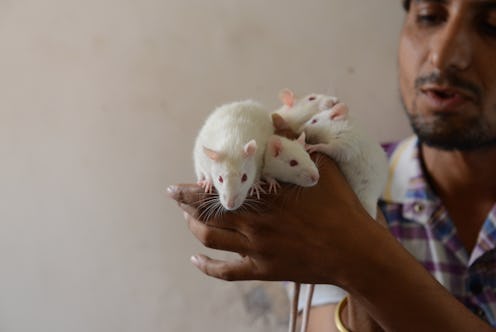News
Tickling Rats In The Name Of Science
Tickling rats. It sounds like a euphemism for something not quite acceptable for print but is, in fact, science. While it may not be the most technologically innovative method of research, scientists are finding that tickling rats can provide insight into why and what makes humans feel ticklish. A new study pinpointing the so-called "tickle center" in mammals' brains shows that laughter can be elicited by stimulating certain neurons in the brain as well as through physical stimuli.
Normally, I'm not one to advocate animal testing and, as a highly ticklish individual, I'll be the first to tell you that tickling is indeed a form of playground torture. Yet I can't help but smile at footage of rats laughing and jumping for joy while being tickled by trained researchers. It almost makes me want to be tickled myself. Almost.
If you're questioning the need to tickle rats (do you just hate all things adorable?), you'll be pleased to know the study has provided some ground-breaking perspective on how the emotion manifests in the mammalian brain. While tickling may seem like child's play, there's good reason to study the neurological and psychological science behind it. Ticklishness remains rather mysterious. Scientists have yet to fully understand why we laugh when tickled, why some people are more ticklish than others, or why the majority of us can't tickle ourselves.
In one of the most recent studies, neuroscientists at Humboldt University in Berlin sought to understand more about which region of the brain handles tickling by examining the positive sounds — essentially the rat equivalent to laughter — elicited and the connected activity occurring in the rat's brain when tickled. They found, for the first time, that the same playful vocalization and increased cell firing rate elicited through physical tickling could also be provoked by directly stimulating neurons in the brain's somatosensory cortex.
While scientists previously thought this region was only capable of processing the feeling of being tickled, new research shows it may also be able to trigger other related behaviors, like laughter. "This is very important, clear evidence that the activity of those cells is responsible for ticklishness," Humboldt University neuroscientist Shimpei Ishiyama told Science magazine.
The study also found a clear link between ticklishness and mood with the rats presenting as less ticklish when feeling anxious. The study's finding supports a long-held hypothesis that factors like mood or physical and mental comfort can affect ticklishness. Consider how being tickled by someone you know and are comfortable with can be a positive experience whereas getting tickled by a stranger can leave you upset and uncomfortable.
So what does a rat laughing sound like? Good question. If you've never heard a rat laugh, you're not alone. The ultrasonic squeaks rats let loose when playing or being tickled are normally beyond human hearing, according to Science magazine. But you can listen for them in this video. These sounds are linked to positive emotions firing off in the animal's brain and are sometimes accompanied with little "jumps for joy."
Who knew so much could be learned by tickling a rat!
